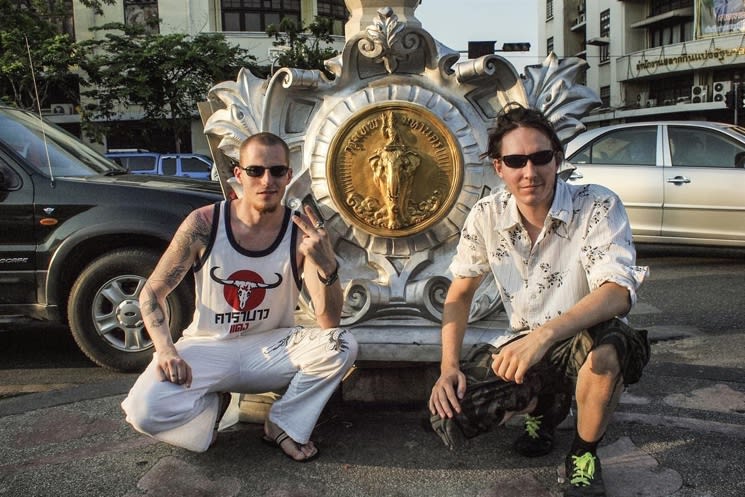In July of 2010, the body of Finnish tourist Janni Raappana was found dead on the streets of Phnom Penh, Cambodia, under mysterious circumstances. The local authorities and media claimed his death a suicide despite ample evidence pointing to a public gangland-style execution. This was the final stop of a drug-fuelled bacchanal across Southeast Asia started with fellow countrymen Joonas Neuvonen and Antti, who gradually lost contact with the spiralling Raappana as his addictions to the readily available narcotics took hold. To this day, nobody knows what really happened to their friend, and this absence of this information has weighed heavily on Neuvonen.
Lost Boys is the efforts of the director to assemble the missing pieces of Raappana's tragic end and to reckon with what he perceives as his personal culpability as a participant who was along for the ride. The film is a pseudo-followup to Neuvonen and co-director's Sadri Cetinkaya's controversial and bleak documentary Reindeerspotting: Escape from Santaland, which followed Janni in Rovaniemi, Finland, while he engaged in petty crime to fuel his hard drug habits and stave off his debtors. Unlike the vulgar cinema verité style of this previous film, which seems to deliberately recall the direct involvement style of such films as Stefan Jarl and Jan Lindqvist's They Call Us Misfits, Lost Boys represents a more mature and existential exercise that attempts to balance the uncomfortably crass behaviours of its subjects with the contemplation of their consequences.
Split between Neuvonen's present-day excursion to Cambodia to pick up the trail of his late friend and the generous amount of provocative cellphone footage of their hedonistic exploits, there is a fine balancing act within the film's Heart of Darkness-esque descent into the unknown. Neuvonen's return trip to Southeast Asia is presented in expressive establishing shots and moody POVs of his journey wading back into the underbrush of Thailand and Cambodia to reiterate a kind of detached "foreigner in a foreign land" approach. In contrast, the videos recorded on his phone — which detail, in disturbingly graphic detail, the trio's hefty sampling of narcotics and local sex workers — bring the audience right back down to earth with their immediate, intimate and uncomfortable realism. Occasionally, Neuvonen breaks up the search with a personal account (narrated by Pekka Strang) of his experience in a prison detox facility after he was charged with drug trafficking in Rovaniemi back in 2013.
Neuvonen's search is tinged with both penance and fear as he brazenly walks the slums of Cambodia, collecting what information he can from the mystified locals who barely remember what to the director was an immense tragedy. While the film occasionally wades into uncomfortable territory with its broad-stroke depictions of these impoverished Southeast Asian communities, Neuvonen's relatively nuanced perspective allows the film to avoid exploitation despite the graphic nature of its realism. Through the interviews with the locals and the incriminating video footage, it is made evident that Janni's story is an all-too-common conclusion for foreigners who trifle with local custom and culture for the sake of selfish gratification. "If you don't want to play games, you [should] not come to Cambodia," one of the sex workers tells Neuvonen in one of the many eye-opening interviews.
While I am still pondering the necessity of its excesses (how many times do we really need to see the trio shoot up heroin, pop pills, or sleep with sex workers before their self-destructive hedonism is communicated?), I cannot deny the effectiveness of its atmosphere and the gravity of its revelations. Neuvonen's investigation is deeply personal, and the film captures that emotional journey with expertise. While it wastes the ample opportunity to condemn drug and sex tourism in clear terms – with the excessive footage of indulging muddying the message — the fact the film is the investigation into a potential murder that happened within this world does enough work to be fair. Lost Boys is a uniquely personal documentary that is hard to recommend but harder to forget.
'Lost Boys' Is a Hedonistic Critique of Drug and Sex Tourism
Directed by Sadri Cetinkaya and Joonas Neuvonen

BY Chris LuciantonioPublished Nov 23, 2021